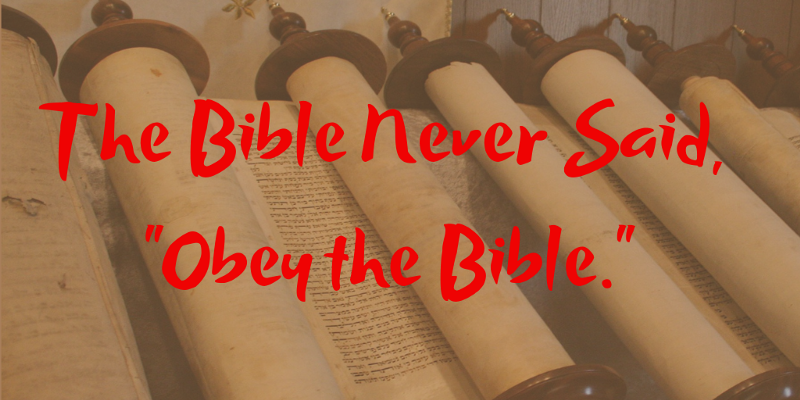
We must obey the gospel because it is the final standard in all matters of faith and life.
In “Obey the Gospel,” the Three Failed Pastors discuss the Christian system as guided not by a written text but by an oral announcement.
“Obey the Gospel” Episode Notes:
In saying that the gospel is the final authority for all matters of Christian faith and practice I have intentionally coopted the formula traditionally applied to the Bible.[1] The church must look to the gospel and not to the Bible as the authoritative guide for the individual Christian and as the basis of unity within the Christian movement.
In this section we will:
- Survey the failings of the Bible as the authoritative guide
- Outline God’s intent for a scriptural use of Scripture
- Make a biblical case for the gospel as our standard
- Explore the practical implications of making the switch.
The Bible won’t cut it.
Astute readers will instantly recognize the irony of the heading above. It’s common in Christian vernacular to refer to the Bible as a sword. We make the association based on a couple of iconic scriptures:
For the word of God is alive and active. Sharper than any double-edged sword, it penetrates even to dividing soul and spirit, joints and marrow; it judges the thoughts and attitudes of the heart. (Hebrews 4:12 NIV)
Take the helmet of salvation and the sword of the Spirit, which is the word of God. (Ephesians 6:17 NIV)
“Word of God” in the Hebrews verse obviously refers to the Scriptures available to the author since he (or she) had been expounding Psalm 95 just prior. Paul in the Ephesian passage refers to something else since this preliterate Gentile church didn’t have access to a leather-bound volume they could wave around. That should be obvious at least to Bible scholars. As we will see not only does “word of God” refer to something else in Ephesians, none of the instances of its use in Paul’s writings refer to the Bible.
As nearly as we can tell, the passage in Hebrews is the only place in the New Testament where Scripture (not including the New Testament) is specifically called “the word of God.”
If this is the case (and we will prove that it is) why does every Christian everywhere immediately envision a gold-leafed volume whenever “word of God” is uttered? We contend that the association has come down from the Reformers and not from the apostles. Not only is the doctrine of sola scriptura[2] unbiblical (ironically) it’s also destructive.
The letter kills
It has been said that rules were made to be broken. To that maxim I would add, “And it doesn’t matter who made them.” Far from being a sin deterrent, Paul describes God’s law as “the power of sin.”[i] He unpacks that shocking statement in Romans 7 where he describes three different laws weaving us into a web of sinful behavior. The law of sin is an innate rebellious tendency residing within each person. The law of sin becomes activated when it encounters the law of God. The law of God on one hand and the law of sin on the other pull the person in two. The inner self longs to be righteous but fallen physical person craves what is now forbidden. It seems that the writers of the New Testament conceived of death was the separation of body from spirit.[ii] So Paul aptly calls this personal disintegration “the law of death.” At the end of the chapter the tension forces Paul to cry out, “Who will rescue me from this body that is subject to death?”
As Paul repeatedly reminds his readers in Romans 7, there was nothing wrong with God’s law except who it was addressed to. And yet the repeated violation of God’s law was no indication that it had been given in vain. According to Romans 5:20a “The law was brought in so that the trespass might increase.” It doesn’t seem that God has ever been a moralist, but that he will even incite sin for a higher purpose:
But where sin increased, grace increased all the more, so that, just as sin reigned in death, so also grace might reign through righteousness to bring eternal life through Jesus Christ our Lord. (Romans 5:20b-21 NIV)
Grace doesn’t mitigate sin; it converts it to more grace. And having in desperation come for grace we find freedom from sin’s grip. Since the law is the power of sin, God’s grace breaks that power through this truth, “Therefore, there is now no condemnation for those who are in Christ Jesus…” (Romans 8:1 NIV)
These dynamics of sin, law, and death aren’t specific to the Torah. It’s not the content of the law but the nature of law that awakens sin and kills the sinner.[iii] We affirm that Scripture comes from God and is good, but that it can become deadly when used to produce a litany of religious rules.
While Protestant and evangelical traditions insist that salvation is by grace through faith apart from works, they’ve continued to formulate behavioral prescriptions from Bible passages. The church might agree that “There is no condemnation to those who are in Christ Jesus,” but not with the basis of that confidence which was:
All things are lawful, but not all things are profitable. All things are lawful, but not all things edify. (1 Corinthians 10:23 NASB95)
The church’s tendency to retain the Bible as a legal standard appears in the way the above verse is rendered in the NIV.[3]
Since nothing in the Greek text indicates a need for quotation marks around any part of this verse and with no Greek analogue to “you say” there must be some other reason why these additions were made to this translation.[iv] It seems obvious that it was to steer readers away from an antinomian reading of Paul. At yet, in so far as law is defined as written rules, Paul was antinomian. The gospel of grace cannot coexist with any written code.
How ironic that the church has turned Paul’s letters into the very thing he abhorred.
I have the right to do anything—but not everything is beneficial. I have the right to do anything—but not everything is constructive.
Much disputing
Nobody fully understands the Bible. We should, and do, suspect anyone who claims to. The church has spent two millennia collecting, rejecting, losing, canonizing, translating, updating, studying, and expositing a collection of writings by various authors we relate to less and less with the passage of time. While various attempts have been made to affirm the utility of Scripture because of divine aid, nobody has called off the interpretive enterprise citing the achievement of complete understanding. We find this dynamic among literary and even legal scholars, but their texts don’t carry the weight of divine authority. If the Bible is God’s standard, we don’t get to get it wrong and yet we’ve yet to get it right.
Since no one understands the Bible, no two people understand it exactly alike. If we really treated the Bible as our sole standard no congregations could exist because each person would find all others out of compliance with his or her interpretation. Unity among Christians only exists where the Bible has come under some other authority whether or not the group admits it. Denominations are built not on the Bible but on Bible interpreters. Historically, the more actual authority a group delegates to Scripture the less cohesive it becomes.[4]
It’s good that the Bible prohibits using the Bible as our standard since it also commands us to be unified.[v] According to Paul, the removal of a legal code was a precondition to unity among God’s redeemed people:
But now in Christ Jesus you who once were far away have been brought near by the blood of Christ.
For he himself is our peace, who has made the two groups one and has destroyed the barrier, the dividing wall of hostility, by setting aside in his flesh the law with its commands and regulations. (Ephesians 2:13-15a NIV)
It’s easy for the modern Christian to read this text and casually agree that requirements like circumcision needed to be removed to allow Gentiles to join Israel, but circumcision was no mere tradition or cultural phenomenon. Genesis 17 unequivocally decrees that uncircumcised males must be excluded from God’s people. If Scripture can be set aside for unity in one place, by what rationale do we make Scripture the arbiter of unity in another?
From the time Christians started treating the Bible as their supreme authority it has stood in the way of unity. The Colloquy of Marburg[vi] poignantly demonstrates the Bible’s ability to divide God’s people. Held just 12 years after Luther nailed up his 95 Theses, this meeting aimed at resolving a doctrinal difference over the unity feast of Christ – the eucharist. Martin Luther and Huldrich Zwingli were called together by German nobility to consolidate their respective reform movements. Of the 15 points of doctrine to be discussed at the colloquy, 14 were summarily accepted by both camps. On the 15th issue, the significance of communion, Luther chose “biblical authority” over his brother. With the New Testament as with the Old, the letter still kills, and the law still divides.
“Obey the Gospel” corrections:
In this episode, Nathan made up some statistics on the spot regarding mandatory drug sentencing for crack cocaine vs. cocaine powder. Here are the correct statistics:
The U.S. Congress passed the Anti-Drug Abuse Act of 1986, which allocated $1.7 billion to the War on Drugs and established a series of “mandatory minimum” prison sentences for various drug offenses. A notable feature of mandatory minimums was the massive gap between the amounts of crack and of powder cocaine that resulted in the same minimum sentence: possession of five grams of crack led to an automatic five-year sentence while it took the possession of 500 grams of powder cocaine to trigger that sentence. Since approximately 80% of crack users were African American, mandatory minimums led to an unequal increase of incarceration rates for nonviolent Black drug offenders, as well as claims that the War on Drugs was a racist institution.
“War on Drugs,” Encyclopedia Britannica Online
“Obey the Gospel” Footnotes:
[1] Westminster Larger Catechism, Question 3: “What is the Word of God?” Answer: “The holy Scriptures of the Old and New Testament are the word of God, the only rule of faith and obedience.”
[2] We understand that there are differences in the way various traditions define this doctrine, but we use it to refer to the belief that the Bible is the final authority by which all others must be evaluated.
[3] We don’t mean to pick on the NIV. It’s our preferred translation. But since it is recent and applies a functional equivalence method of translation, it sometimes displays the biases of contemporary biblical scholars.
[4] The “American Restoration Movement” grew out of the proposition that all human authority should be rejected in favor of a simple reading of Scripture. It immediately splintered into over 60 factions.
References:
[i] 1 Corinthians 15:56
[ii] James 2:26
[iii] 2 Corinthians 3:6
[iv] The NIV makes the same modifications in a parallel passage – 1 Corinthians 6:12
[v] Romans 15:5-6; 1 Corinthians 1:10; Philippians 2:1-2
[vi] https://www.britannica.com/event/Colloquy-of-Marburg







